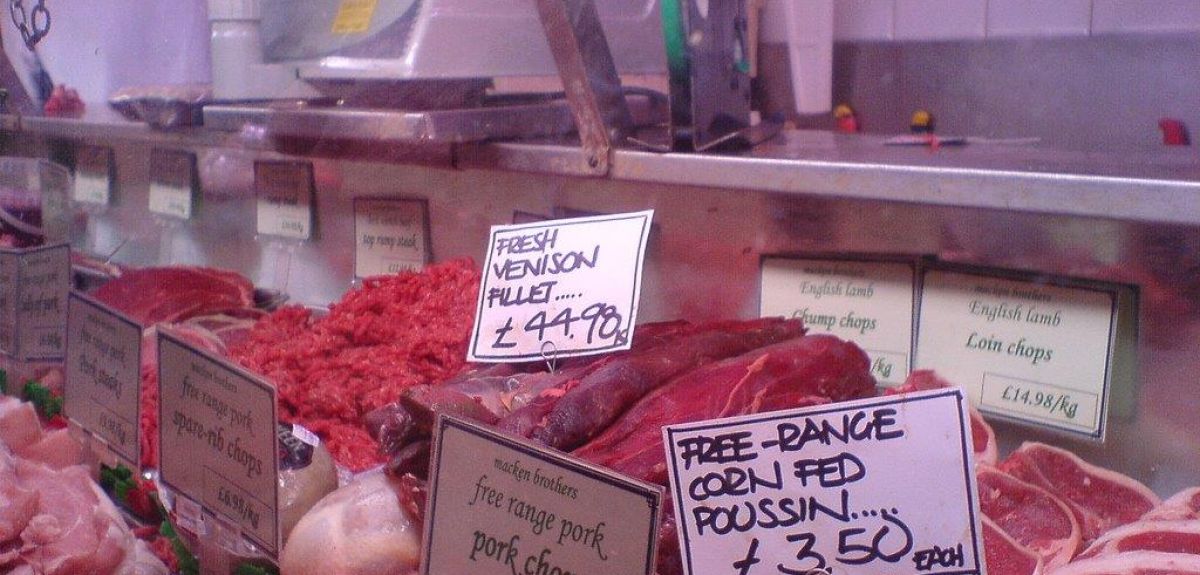
Henry Bloomfield (Flickr Creative Commons)
The ethical arguments against eating meat
A recent BBC comedy written by Simon Amstell imagined life in 2067 when society has become vegan and people flock to support groups to cope with their guilt about their meat-eating past.
The premise might sound far-fetched to many viewers, but there an Oxford University philosopher says there are serious ethical arguments for giving up meat.
In a guest post, Julian Savulescu, the Uehiro Professor of Practical Ethics at Oxford, says that cutting down on our consumption of meat and animal products is "one of the easiest things we can do to live more ethically".
Here, he gives five ethical arguments for giving up meat:
1. The environmental impact is huge
'Livestock farming has a vast environmental footprint. It contributes to land and water degradation, biodiversity loss, acid rain, coral reef degeneration and deforestation.
Nowhere is this impact more apparent than climate change – livestock farming contributes 18% of human produced greenhouse gas emissions worldwide. This is more than all emissions from ships, planes, trucks, cars and all other transport put together.
Climate change alone poses multiple risks to health and well-being through increased risk of extreme weather events – such as floods, droughts and heatwaves – and has been described as the greatest threat to human health in the 21st century.
Reducing consumption of animal products is essential if we are to meet global greenhouse gas emissions reduction targets – which are necessary to mitigate the worst effects of climate change.
2. It requires masses of grain, water and land
Meat production is highly inefficient – this is particularly true when it comes to red meat. To produce one kilogram of beef requires 25 kilograms of grain – to feed the animal – and roughly 15,000 litres of water. Pork is a little less intensive and chicken less still.
The scale of the problem can also be seen in land use: around 30% of the earth’s land surface is currently used for livestock farming. Since food, water and land are scarce in many parts of the world, this represents an inefficient use of resources.
3. It hurts the global poor
Feeding grain to livestock increases global demand and drives up grain prices, making it harder for the world’s poor to feed themselves. Grain could instead be used to feed people, and water used to irrigate crops.
If all grain were fed to humans instead of animals, we could feed an extra 3.5 billion people. In short, industrial livestock farming is not only inefficient but also not equitable.
4. It causes unnecessary animal suffering
If we accept, as many people do, that animals are sentient creatures whose needs and interests matter, then we should ensure these needs and interests are at least minimally met and that we do not cause them to suffer unnecessarily.
Industrial livestock farming falls well short of this minimal standard. Most meat, dairy and eggs are produced in ways that largely or completely ignore animal welfare – failing to provide sufficient space to move around, contact with other animals, and access to the outdoors.
In short, industrial farming causes animals to suffer without good justification.
5. It is making us ill
At the production level, industrial livestock farming relies heavily on antibiotic use to accelerate weight gain and control infection – in the US, 80% of all antibiotics are consumed by the livestock industry.
This contributes to the growing public health problem of antibiotic resistance. Already, more than 23,000 people are estimated to die every year in the US alone from resistant bacteria. As this figure continues to rise, it becomes hard to overstate the threat of this emerging crisis.
High meat consumption – especially of red and processed meat – typical of most rich industrialised countries is linked with poor health outcomes, including heart disease, stroke, diabetes and various cancers.
These diseases represent a major portion of the global disease burden so reducing consumption could offer substantial public health benefits.
Currently, the average meat intake for someone living in a high-income country is 200-250g a day, far higher than the 80-90g recommended by the United Nations. Switching to a more plant-based diet could save up to 8 million lives a year worldwide by 2050 and lead to healthcare related savings and avoided climate change damages of up to $1.5 trillion.'
This article takes extracts from a longer article by Professor Savulescu and Francis Vergunst of the University of Montreal, which was first published in The Conversation.